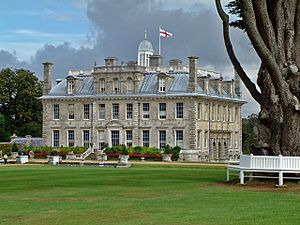George Bankes facts for kids
Quick facts for kids
Sir
George Bankes
KB
|
|
|---|---|
| Personal details | |
| Born | 1788 |
| Died | 1856 Old Palace Yard, Westminster |
| Nationality | British |
| Spouse | Georgina Charlotte Nugent |
| Children | Edmund George Bankes |
| Parents |
|
| Residences | Old Palace Yard Kingston Lacey |
| Education | Westminster Trinity Hall, Cambridge |
| Occupation | judge |
| Profession | barrister-at-law |
George Bankes (1788–1856) was an important figure in British law and politics during the 1800s. He was the very last person to hold a special judge role called the Cursitor Baron of the Exchequer. This old job was ended in 1852.
Even though he didn't have much experience as a lawyer in court, he was the last lawyer to be given this old-fashioned judge position.
Early Life and Education
George Bankes was born in 1788. He was the third son of Henry Bankes, who was a Member of Parliament (MP) for nearly 50 years. His mother was Frances Woodley.
George Bankes came from a famous family. His ancestor was Sir John Bankes, who was a Chief Justice (a very important judge) during the time of King Charles I.
George went to Westminster School and later studied at Trinity Hall, Cambridge university.
A Career in Law and Politics
After university, George Bankes studied law. He became a barrister (a type of lawyer who argues in court) in 1815. The next year, he became a Member of Parliament (MP). He represented the area of Corfe Castle, just like his father.
He served as an MP for many years. In 1822, he became a bankruptcy commissioner. This meant he helped deal with cases where people or businesses couldn't pay their debts. In 1824, he was appointed Cursitor Baron.
George Bankes also held other important government jobs. In 1829, he worked for the India Board, which managed affairs in India. The next year, he became a Junior Lord of the Treasury. This role involved helping to manage the country's money.
He continued to be an MP for Dorset county from 1841 until he died. He was a member of the Tory party. He strongly disagreed with some of the government's ideas about trade.
In 1852, George Bankes became the Judge Advocate General. This job involved advising the government on military law. He also became a Privy Councillor, which is a group of important advisors to the King or Queen.
In 1855, his older brother passed away, and George inherited the family home, Kingston Lacy. However, George himself died the next year, in 1856, at his home in Westminster. He had three sons and five daughters with his wife, Georgina Charlotte. His eldest son, Edmund George Bankes, inherited Kingston Lacy.
His Writings
George Bankes was also a writer. He wrote a book called The Story of Corfe Castle and of many who have lived there. This book was about the history of Corfe Castle and the people who lived there.
He also wrote a story called Brave Dame Mary. This book was inspired by the life of Mary Bankes, a brave woman from his family's history.
 | May Edward Chinn |
 | Rebecca Cole |
 | Alexa Canady |
 | Dorothy Lavinia Brown |


